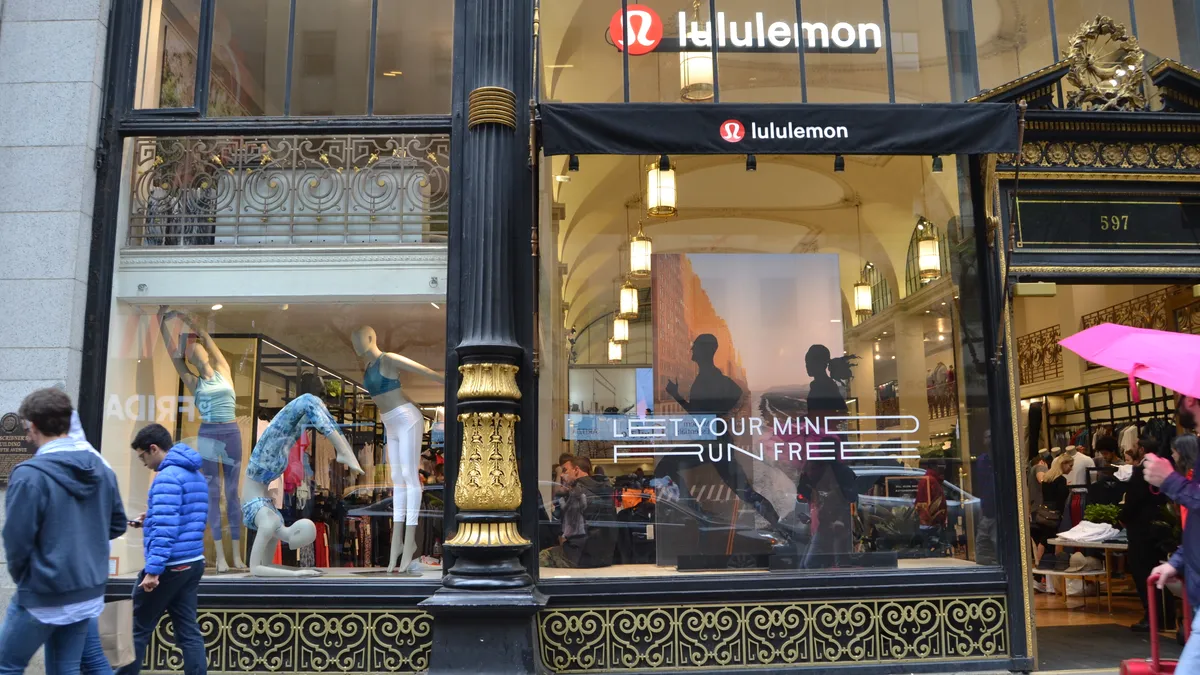Dive Brief:
- Lululemon's net revenue rose 30% year over year to $1.5 billion in the third quarter, while operating income rose 26% despite a challenging supply chain environment for the industry, according to a company release.
- The brand's direct-to-consumer revenue rose 23% and represented more than 40% of the company's total revenue.
- Amid what CEO Calvin McDonald described to analysts as a "challenging year for digital fitness," the company lowered its revenue estimates for its Mirror unit to $125 million to $130 million — roughly half of what executives projected earlier this year.
Dive Insight:
Lululemon pulled off a strong quarter in a difficult operating environment for just about every brand and retailer out there.
McDonald noted Thursday that "we continue to face the same issue as much of the industry, including port slowdowns and increased costs associated with air freight." McDonald said that all factories in Vietnam that produce for the brand have reopened, and despite previous manufacturing closures and delays Lululemon's total inventory was up 22% in Q3, ahead of previous expectations.
The brand's margins show some of the difficulty from the year, with gross margin for Q4 expected to be relatively flat compared to 2019, under pressure from a 450 basis point cost increase due to air freight. Those are costs being incurred by many players as they try to avoid congestion at ports. Others, such as Gap Inc., have racked up air freight costs without having anything to show for it in their top or bottom lines.
"While supply chain challenges persist, LULU has done well to navigate these headwinds and continues to benefit from a solid penetration of core, seasonless styles that help mitigate pressure from receipt delays," Telsey Advisory Group analysts led by Dana Telsey said in an emailed note.
The brand's shunning of discounts has also helped protect its profits. That even applied to the week of Black Friday. "[W]e didn't take further markdowns, we don't play promotion as you know," McDonald said of the period including Thanksgiving and Cyber Monday. CFO Meghan Frank noted that Lululemon's markdowns declined from 2019 levels.
Credit Suisse analysts led by Michael Binetti said in an emailed note that they believe Lululemon "has among the most pricing power in our coverage, if the brand needs to pull that lever" but for now is "one of few companies ... that isn't urgently commenting on price increases to drive sales or [gross margins] next year."
Binetti also described the fitness tech unit Mirror, which Lululemon acquired last year, as a "distraction" and estimated the company knocked off roughly $100 million in estimated sales from Q4 alone. Cutting revenue and marketing spending for Mirror so "severely" ahead of Q4 is "worrisome, and we fear the brand may need a very significant strategic pivot," Binetti wrote.
McDonald continued to express optimism around Mirror and what its technology and brand can offer Lululemon overall. "Our vision for Mirror is to assist in building and extending our Lululemon community and helping us drive both retention and spend," he said. "It's an evolution of our membership program to propel our core business at Lululemon for Lululemon. We have only just begun our journey with Mirror and we will continue to roll out initiatives that deliver on this goal."













